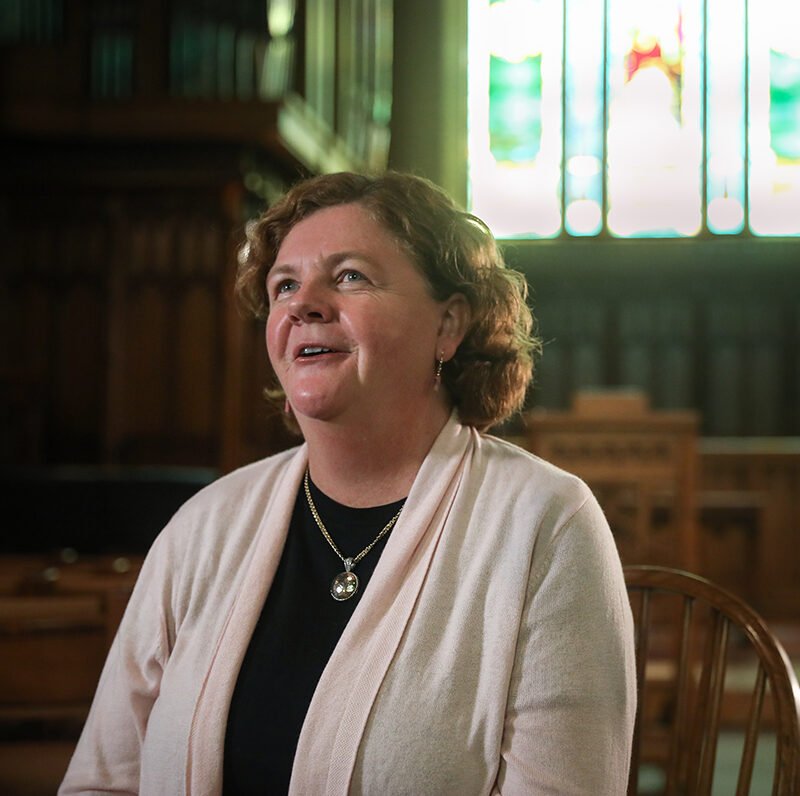Rev. Bonnie-Jeanne Casey

Reverend Bonnie-Jeanne Casey sits in a sunny spot in Phillips Church in mid-August, looking ahead to a fall like none other in Exeter’s history.
With physical distancing, mask-wearing and other restrictions due to the COVID-19 pandemic, she finds it hard to predict what exactly her work as the school’s new director of religious and spiritual life might look like — but she expects much of it won’t take place in this historic building on the corner of Front Street and Tan Lane.
“I think we’ll be outside in small-group settings as much as we can, because the health and safety of everybody is going to be paramount,” Casey says.
Casey is just getting to know the campus, having recently moved from Arlington, Massachusetts, with her wife, Maggie O’Grady, and their 7-year-old son, Thomas. She was immediately struck by all the natural beauty in and around Exeter, and looks forward to finding “sacred spaces” for conversation and contemplation outside of the traditional chapel environment. She hopes that students and other members of the Exeter community will do the same.
“One of the great learnings of religion is that you take the weather with you,” she says. “You take spirituality with you.”
Casey knows whereof she speaks. Raised in a Catholic family near Boston, she earned a B.A. from Smith College and a Master of Divinity from Harvard Divinity School. Along the way, she embraced the more liberal teachings of the Unitarian Universalist faith, and was ordained as a minister in 1995. “My tradition lives the multi-faith tradition of the country in some ways,” Casey says. “We feel like it’s our duty to learn about the religions of the world … to better understand our own traditions.”
After serving as an associate minister at a church in Madison, Wisconsin, Casey spent six years as parish minister at Philadelphia’s Church of the Restoration. In the wake of the 9/11 terrorist attacks, when Casey’s church became a sanctuary for the grieving population of north Philadelphia — located a short bus or train ride away from New York City — she began thinking about expanding her mission beyond fellow members of her own faith.
“I said to myself, if I stay as a parish minister, I’m just going to meet other Unitarians, people who think like I do,” she recalls. “I felt as though the world really needs a warm welcome to learn about other people’s religions. So, I embarked on this road to go into education more than congregation ministry.”
Casey worked as a chaplain at Wellesley College and director of spiritual life at Babson College before moving into a long-time role at Simmons University in Boston. Initially hired to complete a diversity, equity and inclusion inventory at the school, she became its director of spiritual life in 2011. Casey began taking finance courses while at Wellesley and completed her Master of Business Administration degree at Simmons before she began working there.
“I really wanted to understand money as a resource, and be a good steward of resources,” she says of the decision to get her MBA. “The ministry is often about power, and about finding ways to help the powerless and reckon with the powerful. I think a business degree helps you learn different skills on how to do that.”
Having more than once been in the position of counseling students faced with leaving their studies because they could not afford tuition, Casey is particularly sensitive to the issue of financial inequalities among students at the institutions where she works. At Simmons, her office set up substantial scholarships that enabled students to get paid while doing work in their own faith or another faith tradition that interested them.
“Phillips Exeter is really on the forefront of taking financial equity seriously, and that’s one of the things that gets me excited about working at the institution,” Casey says. “There’s always more to do.”
At Exeter, Casey will be working with a younger population of students, but it’s a group she has long been interested in through her research work. For her doctorate, which she earned at Boston University, Casey focused on young members of the growing group known as “nones” — 14- to 18-year-olds who claim to have no religious identity, or a multiple religious identity. She believes these young people are “changing the landscape” of religion today, but not exactly in the way most people think.
“Everyone will point to a Pew study from several years ago where they started seeing this secularization [of America],” Casey says. “My experience has not been so much of a secularization as a different spiritualization. … People are coming to recognize that as wonderful as their own tradition might be, and as firmly rooted in that tradition they might be, there are other traditions that have insight and wisdom. All we need to do is to open our ears and our hearts to what those messages are.”
For her first few months at Exeter, Casey is seeking to build a welcoming environment that will encourage curiosity, empathy and humility in the classroom, as well as in the religious and spiritual life on campus. “At bottom, what makes us good learners is that we don’t think that we know it all, and that we’re interested to learn more,” she stresses. “If we bring that sense of curiosity to our understanding of other people, then I think we’re setting ourselves up more for success than if we didn’t have that humility at the root.”
As for all the uncertainty surrounding what fall — and beyond — will bring, Casey knows one thing for sure. “I think the students are going to have to lead with what they want,” she says. “We really have to figure it out together.”
— Sarah Pruitt ’95